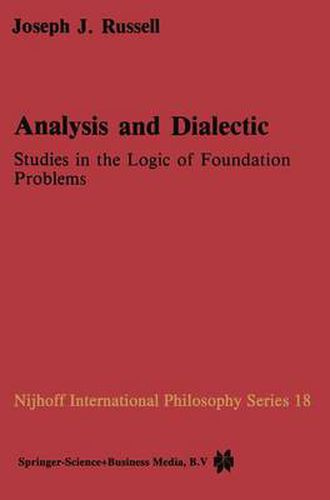Readings Newsletter
Become a Readings Member to make your shopping experience even easier.
Sign in or sign up for free!
You’re not far away from qualifying for FREE standard shipping within Australia
You’ve qualified for FREE standard shipping within Australia
The cart is loading…






This title is printed to order. This book may have been self-published. If so, we cannot guarantee the quality of the content. In the main most books will have gone through the editing process however some may not. We therefore suggest that you be aware of this before ordering this book. If in doubt check either the author or publisher’s details as we are unable to accept any returns unless they are faulty. Please contact us if you have any questions.
The present book was written some twenty years ago but it has not lost its topicality, for it contains an important re-assessment of the relations of two main streams of contemporary philosophy - the Analytical and the Dialectic. Adherents and critics of these traditions tend to assurnethat they are diametrically opposed, that their roots, concerns and approaches contradict each other, and that no reconciliation is possible. In contradistinction Russell derives both traditions from the common root of the dissatisfaction with the arguments against speculative philosophy. These according to the author leave a lacuna - certain elementsof our Weltanschaaung have been removed, but they cannot be removed without replacement lest we have an incomplete world view, so incomplete in fact that it cannot be viable. According to Russell part of this vacuum is taken up by the analytical tradition but this tradition is not capable of taking up the remainder of it. That portion of the vacant space is however taken up by the dialectical tradi tion, which in turn cannot itself handle the whole of the problem. Thus the two reactions to the demise of speculative philosophy appear to be complementary in at least this sense. But the author goes further, for according to hirn the analytical arguments themselves clearly point to the emergence of dialectical problems, and the dialectical problems themselves need some such background to arise.
$9.00 standard shipping within Australia
FREE standard shipping within Australia for orders over $100.00
Express & International shipping calculated at checkout
This title is printed to order. This book may have been self-published. If so, we cannot guarantee the quality of the content. In the main most books will have gone through the editing process however some may not. We therefore suggest that you be aware of this before ordering this book. If in doubt check either the author or publisher’s details as we are unable to accept any returns unless they are faulty. Please contact us if you have any questions.
The present book was written some twenty years ago but it has not lost its topicality, for it contains an important re-assessment of the relations of two main streams of contemporary philosophy - the Analytical and the Dialectic. Adherents and critics of these traditions tend to assurnethat they are diametrically opposed, that their roots, concerns and approaches contradict each other, and that no reconciliation is possible. In contradistinction Russell derives both traditions from the common root of the dissatisfaction with the arguments against speculative philosophy. These according to the author leave a lacuna - certain elementsof our Weltanschaaung have been removed, but they cannot be removed without replacement lest we have an incomplete world view, so incomplete in fact that it cannot be viable. According to Russell part of this vacuum is taken up by the analytical tradition but this tradition is not capable of taking up the remainder of it. That portion of the vacant space is however taken up by the dialectical tradi tion, which in turn cannot itself handle the whole of the problem. Thus the two reactions to the demise of speculative philosophy appear to be complementary in at least this sense. But the author goes further, for according to hirn the analytical arguments themselves clearly point to the emergence of dialectical problems, and the dialectical problems themselves need some such background to arise.